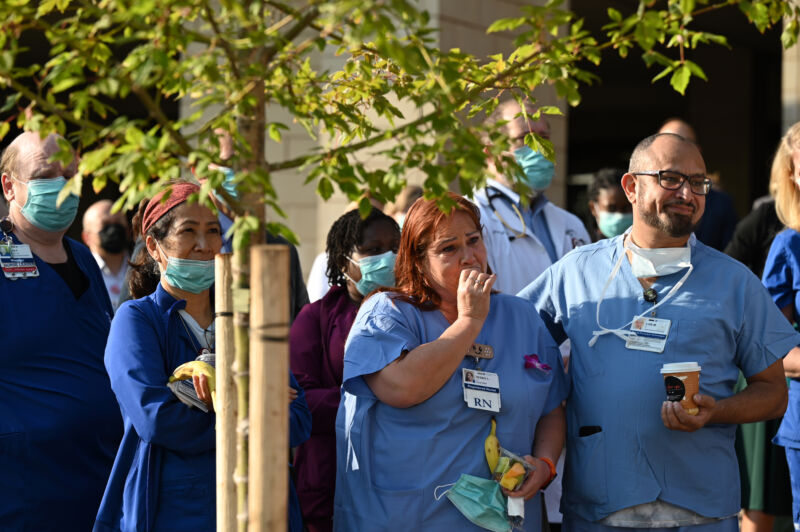
More states are activating crisis standards of care, and at least two have expanded access to COVID-19 vaccine booster doses as the delta wave continues to wash across the country.
While cases and hospitalizations have subsided in previous southeastern hotspots such as Florida and Alabama, the wave has headed north and west. Nationally, new cases of COVID-19 have plateaued at a high level of more than 70,000 per day, down from September peaks of upwards of 160,000.
North Dakota, Colorado, Minnesota, Alaska, and Vermont currently have the top-five highest case rates per 100,000 people, according to tracking by The New York Times. New Mexico, which ranks seventh for the highest daily case rates, is seeing a surge in hospitalizations, and more facilities are moving to crisis standards of care.
Effective Thursday, the two largest healthcare systems in Albuquerque—the University of New Mexico Health System and Presbyterian Healthcare Services—announced that they are activating crisis standards.
“Currently at UNM today, we’re operating at about 140% of our normal operating capacity, and I’ve had moments where we’ve approached 150%. This really is an unsustainable and unprecedented level of activity that we’ve been able to create,” Dr. Michael Richards, senior vice president for clinical affairs at UNM Health System, said at a press conference Thursday.
According to reporting by ABC News, “multiple” other health systems in the state are also considering implementing crisis standards.
Crises and boosters
“Our hospital teams are really stretched thin, and we are seeing way more patients than they thought possible,” Dr. David Scrase, acting cabinet secretary of the state’s Department of Health, said during the press briefing on Wednesday, according to ABC News. “What it means is if one of the people watching this press conference has a heart attack right now, there’s a good chance that we won’t have an intensive care unit bed for that person here in New Mexico.”
Earlier this week, Colorado also reactivated its crisis standards for care given the surge of COVID-19 cases. To try to turn the tide, Colorado Governor Jared Poli announced on Thursday that the state would open up COVID-19 booster doses to all adults. Currently, the Centers for Disease Control and Prevention only recommends boosters for certain groups.
“We want to ensure that Coloradans have every tool they need to protect themselves from this deadly virus and to help reduce the stress on our hospitals and health care workers. Every Coloradan is now eligible to get the booster so they can protect themselves and their families,” Governor Polis said in a statement. “I was relieved to get the booster two weeks ago and strongly encourage you to get it, too.”
And Poli is not alone. California is also providing more leeway for adults to get booster shots, regardless of whether they fall neatly into the CDC’s approved groups. In a press conference Wednesday, California’s secretary of health and human services, Dr. Mark Ghaly, noted evidence of waning protection from initial doses amid high levels of transmission in various parts of the country. “If you’re interested in getting a booster, go ahead and get one,” he said.
On Tuesday, Pfizer and BioNTech submitted a request to the Food and Drug Administration to make booster doses of their vaccine available to people ages 18 and up nationwide. The FDA is expected to grant the request, but the timing is not yet clear.
https://arstechnica.com/?p=1812798

